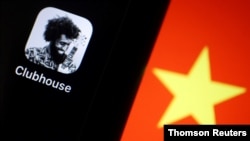For a brief time before Beijing banned the audio chat app Clubhouse, tech-savvy Chinese joined global discussions on taboo topics — Beijing’s placement of Uighurs in concentration camps in Xinjiang, Hong Kong’s pro-democracy movement and the 1989 Tiananmen Square protests — absorbing perspectives and information far outside the lines drawn by the Communist Party.
Unlike Twitter posts, there was no public record of the app’s audio messages, which may complicate official monitoring efforts, according to Stanford Internet Observatory blog.
Only a small fraction of China’s population had access to Clubhouse, which famously requires potential users to obtain an invitation for access. In China, access was further limited because users needed a foreign-registered iPhone. Nonetheless, Beijing moved quickly to ban Clubhouse after workarounds made the app available on February 8, fearing it would undermine their control of public discourse.
To many, that move suggested Chinese authorities felt threatened by the freewheeling Clubhouse discussions and underscored the chasm between an increasingly controlling government and a population increasingly sophisticated at avoiding online controls.
A VOA reporter observed a session on Clubhouse and found the app treated all users equally, making each wait in line to speak, then imposing time limits. The combination, a new experience for the majority of Chinese users, was exciting because “in the process of waiting to speak — users may have to wait for two or three hours for a turn — they would hear different points of view clearly experience the value of listening.”
Yu Ping, the former China country director of the American Bar Association’s Rule of Law Initiative, told VOA that while only a few people with access to iPhones registered outside China can access Clubhouse, they are often members of “China's intellectual class, and for the authorities these are people who need to be more controlled” than ordinary citizens.
Ping pointed out that any authoritarian government like China’s wants to control information and public opinion. In China, if information is not effectively manipulated and public opinion is not well-directed, authorities see an intolerable existential threat to the regime.
Banning Clubhouse and the virtual private networks (VPNs) that give users the ability to surmount the Great Firewall manifests Beijing’s fear, he said.
June Dreyer, professor of political science at the University of Miami, said Chinese authorities removed Clubhouse because audio content is harder to control compared with text content.
Dreyer said although Chinese people used the app to comment on current affairs and even criticize the government, authorities shouldn’t have blocked the app even though they can.
Users are going to get angry because they enjoyed Clubhouse, she said. Blocking it will upset people even more and then they will “seek more ways to vent their grievances. Sometimes it’s just better to let people who want to complain, complain.”
Dreyer said the damage that banning Clubhouse causes to people who want to voice their opinion is limited.
“As I say, people who have things that they want to talk about will always find ways to talk about them,” she said. “They can be repressed or suppressed, but there are always ways around that.”
There are also concerns that the app has security flaws that could provide Chinese authorities access to user information.
The Stanford Internet Observatory believes Clubhouse chatroom metadata are relayed to servers hosted in China, so the Chinese government potentially has access to users’ raw audio.
In addition, the Stanford Internet Observatory blog confirmed that the software that supplies back-end infrastructure to Clubhouse is based in China and because a user’s unique Clubhouse ID number and chatroom ID are transmitted in plain text, it is possible to connect Clubhouse IDs with user profiles.
Clubhouse told the Stanford Internet Observatory blog that it is “deeply committed to data protection and user privacy.”
The app told the blog that when it launched, it was available to every country worldwide except China. Some people in China found a workaround to download the app, which meant that the conversations they were a part of could be transmitted via Chinese servers.
“With the help of researchers at the Stanford Internet Observatory, we have identified a few areas where we can further strengthen our data protection.”




